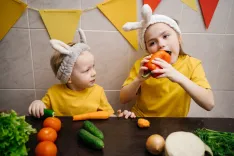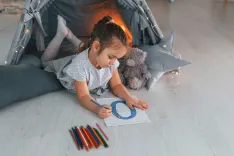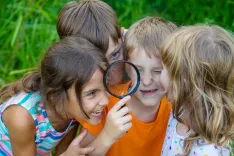Fun and Enlightening Riddles for Kids: Great Ways to Spend Time Together
Riddles for kids encourage careful listening and clever thinking. This collection mixes fun and age-friendly brain teasers that build vocabulary, reasoning, and confidence in a playful, low-pressure way.

Riddles for kids to build logic and language
Solving puzzles and getting the correct answers are hilarious for children. These activities are perfect as they incorporate essential components that are crucial for little minds: entertainment and education. Improved cognitive skills, better mood, and just a joyous pastime – you can find it in riddles for kids, among the best methods to have fun and educate your child. In this article, we’ll discuss the importance of these activities and provide examples of engaging riddles your kids will be eager to solve.
Introduction to Riddles for Kids
There are many educational and fun activities to improve children’s cognitive development. Solving easy riddles for kids is one of them. This pastime entails questions that must be resolved using creativity and critical thinking. The biggest challenge is that the answer may seem easy at first, but actually, it’s not. They are frequently based on wordplay, metaphors, and clever language to make a kid take their time and ponder the puzzle.
Riddles are great for kids, as they’re intended to encourage them to think outside the box and use their creativity. Such puzzles can be straightforward and clear or complicated and mind-bending. There are no rules on how riddles must be written. Moreover, they may be even little poems with rhymes.

Help your child
grow with Keiki
We’ll help you turn everyday screen time into real learning progress.
Try KeikiThe Importance of Riddles in Child Development
For successful development, young minds require brain stimulation. Engaging them in age-appropriate educational activities helps them think critically, enhance reasoning, and improve their creativity. Easy kids riddles can positively impact children’s intellectual, emotional, and social well-being.
Puzzles can’t be solved quickly; they require logical thinking and creativity. By engaging children’s brains to contemplate the questions, they have an incredible opportunity to use and strengthen their intellectual abilities. When little minds learn to think critically, they begin relying on analytical thinking.
Solving easy riddles with answers for kids improves memory and concentration. To address tricky questions, children should focus their attention on details. When solved in a classroom, such an activity also encourages teamwork and collaboration among little students, resulting in improved social ties in the school environment.
As young students answer puzzles correctly, they acquire self-esteem and confidence in their abilities. Riddles help children expand their vocabulary with new words and improve their reading competency. Moreover, they can be easily tailored to challenge students of all ages and abilities, making them inclusive learning experiences.
How to Use Riddles for Fun and Learning
Parents can include kids riddles with answers in regular learning routines. They are perfect for warming up before a core training session, stimulating mental activity, and getting a child ready for further exercises. In addition, solving more brain-cracking puzzles can be a daily task, where a kid is given a more challenging puzzle and contemplates the question for a specific time, like a day or two. The riddles’ nature makes them versatile to suit different situations.
Easy Riddles for Kids
When engaging your child in puzzles, you need to consider their age. If selected right, they are perfect for daily training without requiring a lot of energy and effort. In addition, they provide the opportunity to entertain your little learner while promoting brain activity.
Simple and Fun Riddles for Young Kids
Solving engaging puzzles is a fun and practical approach for kids to explore and comprehend the world. Guessing the right answers to the following riddles will encourage them to establish connections and develop creative thinking:
- I’m a pet with 4 paws. I don’t like cats, and I say “woof.” Who am I? (Dog)
- What has to be broken before you can use it? (Egg)
- I have four legs. I eat a lot of grass. I look like a horse. And I’m black and white. Who am I? (Zebra)
- They appear at night without being called and disappear during the day without being stolen. What are they? (Stars)
- Four legs up, four legs down; soft in the center, hard all around. What am I? (Bed)
These fun riddles for kids easy will make your little learners engage their minds to find the right answers. Such quick and easy exercises are perfect for daily training.
Short Riddles with Clever Answers
Young brains need to be activated and challenged for successful development. The following riddles for kids can help you achieve just that:
- Why are teddy bears never hungry? (They are always stuffed)
- Cats have four, bugs have four, but school has six. What are they? (Letters)
- Sam’s parents have three kids. Their names are Huey, Dewey, and? (Sam)
- What animal can jump higher than a building? (Any; buildings don’t jump)
- What room do ghosts avoid? (Living room)
These kid-friendly riddles are not just brain teasers but also a terrific source of enjoyment. They’ll truly get youngsters to think and have fun.

Funny Riddles for Kids
Entertainment is a crucial element of any learning activity for children. It allows them to better understand the idea in a relatable way – through play. Consider the next riddles for kindergarten and young children to have fun.
Laugh-Out-Loud Riddles
Learning exercises can be both educational and hilarious. Ask your child the following riddles and enjoy a great laugh once the answer is revealed:
- What do you get when you cross a sheep and a kangaroo? (A woolly jumper!)
- What do you call a dog magician? (A labracadabrador)
- What would you find in the middle of Toronto? (The letter “o”)
- Kids can make it, but never hold it or see it. What is it? (Noise)
These riddles for kids funny will make your child use their creativity. The development of this skill is crucial for cognitive growth, allowing one to understand how the world works.
Riddles with Puns and Jokes
As your child’s sense of humor develops each year, so does the enjoyment. You can find various family-friendly jokes, from traditional knock-knock jokes to crazy riddles, that you can tell together, bring to playdates, or enjoy at the dinner table.
- Lettuce. Lettuce who? Lettuce in. It’s freezing out here!
- What do boats do when they are sick? (They go to the doc)
- Where do pencils go for vacation? (Pencil-vania)
- What kind of music does corn listen to? (Pop)
Engaging in these hilarious riddles and jokes can help your children develop a sense of humor. It enhances cognitive and communication abilities, teaching them to view problems from different angles.
Elementary Riddles: Math Riddles for Kids
Solving riddles engages analytical skills, which is perfect for improving math comprehension. Humorous puzzles can imply math concepts that need problem-solving efforts.
Number Puzzles
Dealing with numbers can help children and preschoolers develop a better understanding of math while boosting their cognitive and problem-solving abilities. Here are some examples of number riddles for preschoolers:
- Sudoku. The classic pastime entails completing the missing numbers in a 9×9 square. Each row, column, and block should include the numbers 1–9 without duplication.
- Magic square. Similar to the previous variant, it requires filling in the blank cells. However, the total of each row, column, and diagonal must equal the same answer.
- Domino. The main goal is to arrange all 28 domino pieces on the board, where each spot is assigned a number. A domino can be put only if its numbers multiply to match the number on the board space.
Besides asking basic math riddles that involve counting or subtracting, the above exercises include an entertainment element. This is highly important for young learners to engage better.
Kid Riddles Easy that Teach Math Concepts
While some kids enjoy solving math problems, others aren’t feeling it. The reason for this is the subject’s difficulty for little learners. However, if you add a play element to math lessons, such as a puzzle, children may be more engaged in the educational process.
- What is the product of all the numbers in the dial of a telephone? (One of the numbers on a telephone’s number pad is zero. And zero multiplied by any number equals zero)
- I am a two-digit number. The sum of my digits is 7. What am I? (52 or 25 (5 + 2 = 7))
- When Jake was 8 years old, his little brother, Shawn, was half his age. If Jake is 20 years old today, how old is Shawn? (16)
These examples entail calculating and logic. By engaging in these exercises, your child can develop their math skills in a fun way.
Help your child thrive with playful learning
Turn screen time into real growth with Keiki’s educational games.
Try KeikiSimple Riddles for Kids about Animals
Children love animals for their cute appearances and furry bodies. Even newborns and toddlers are captivated by those living creatures’ distinct characteristics and noises. There are different riddles about animals that’ll fascinate your little one.
Riddles about Pets and Farm Animals
Proposing kids with riddles sparks their curiosity and imagination, making learning fun. With the following puzzles, your child will discover different animal friends:
- I am an animal with two long ears, and I hop but don’t walk. (Rabbit)
- I wag my tail when angry and purr when I’m happy. What am I? (Cat)
- You might be called this animal if someone thinks you’re fearful. (Chicken)
- I plough fields but never sow; I have a corkscrew tail and snuffly nose. (Pig)
Riddles for kindergartners about animals are a great way to engage children. They love figuring out clues, thinking creatively, and getting excited about the answers about their furry friends.
Wild Animal Riddles
Riddles can expand thinking, boost creativity, and encourage healthy competition. They also introduce new words, enhancing vocabulary. Riddles about wild animals are great for expanding language skills:
- I munch leaves from treetops, but my feet never leave the ground. What am I? (Giraffe)
- I jump when I walk and sit when I stand. What am I? (Kangaroo)
- I’m bigger than a house, scared of a mouse, and have great big toes and a hose for a nose. (Elephant)
These puzzles are great for reinforcing knowledge of wild animals. In addition, by engaging in these exercises, you can introduce your little learner to new words.
Hard Riddles for Kids
When your children are done with easy riddles for kids with answers, you can amp up the difficulty level and propose more complex puzzles. They are often longer and require more effort to be solved.
Challenging Brain Teasers
Brain teasers are great for making one use critical thinking and logic. To boost mental activity, ask your kid the following questions:
- Johnny’s mother had three children. The first was named May; the next was named June. What was the name of the third child? (Johnny)
- How many months have 28 days? (All 12)
- What word contains 26 letters, but only three syllables? (Alphabet)
If you want to help your child acquire critical thinking abilities, keep them entertained with a constant flow of brainteasers. Gradually, they’ll become more attentive to details and strengthen their reasoning skills.
Riddles that Require Creative Thinking
Riddles for first graders and older children can be longer and involve tricky situations. They require an extraordinary approach by looking at different perspectives. Consider the following examples:
- A man drives his automobile until he arrives at a motel. When he reaches there, he discovers that he is bankrupt. How did that happen? (The man is playing Monopoly, using a vehicle as his player. He arrives at a motel but doesn’t have enough money to pay the bill.)
- What would you ignite first if you found yourself trapped in a windowless cave with just one matchstick, a candlestick, a kerosene lamp, and a stove to select from? (The matchstick. You can’t ignite any of the remaining things without first lighting the matchstick.)
Let your child explore their imaginative and creative thinking with riddles. As a result, they’ll broaden their horizons and improve their problem-solving abilities.

Help your child
grow with Keiki
We’ll help you turn everyday screen time
into real learning progress.
Keiki World: New Learning Experiences with Engaging Games and Activities
Let your child explore the world of learning that can be both fun and productive. The Keiki App offers valuable content consisting of videos, games, exercises, and activities for children from 1 to 6 years old. This educational platform provides the following features:
- Materials for preparing your little one for kindergarten.
- Homeschooling content with a detailed schedule for independent learning.
- 300+ preschool worksheets on different topics, including creativity, logic, handwriting, and other exercises.
- Fun brain-boosting activities to enhance thinking skills.
- Speech practices with simple and fun training sessions.
Affordable subscription plans, valuable tips for parents, and easy-to-use design will ensure an enjoyable and rewarding experience for both you and your children.
Conclusion
Riddles may be based on different themes, including animals, life-related puns and jokes, or holidays, making them more relatable and engaging for kids. By encouraging your child to participate in a riddle-solving activity, they can promote critical thinking and creativity, essential for cognitive development. As a result, while having fun with easy kid riddles, they also learn and explore the richness of this world.






